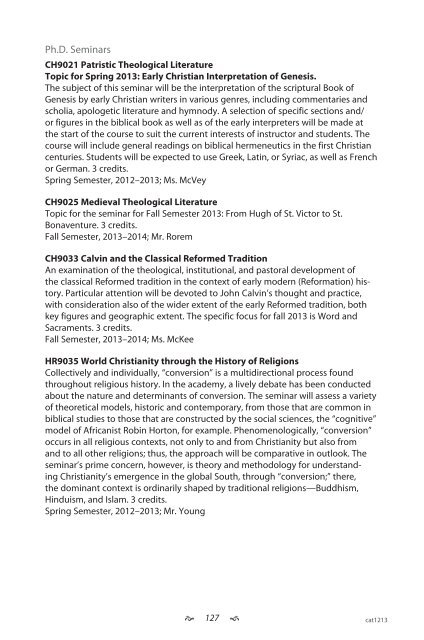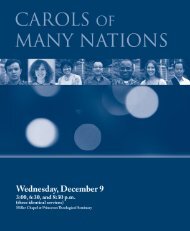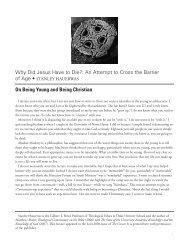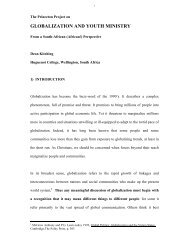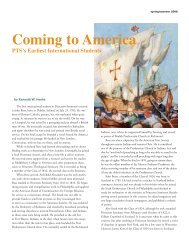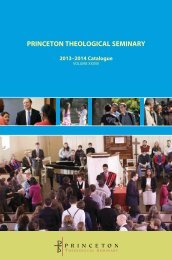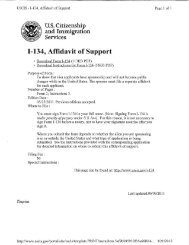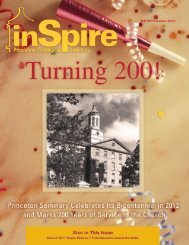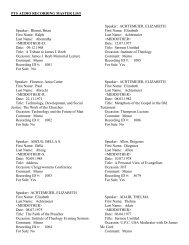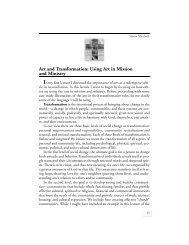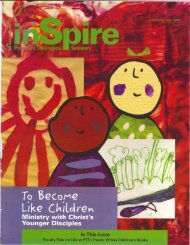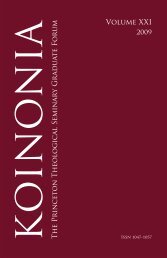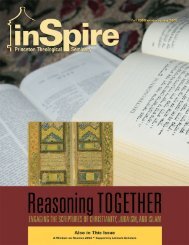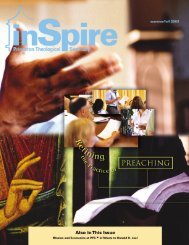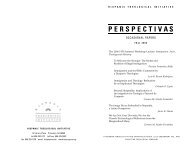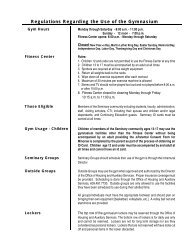PTS Catalogue - Princeton Theological Seminary
PTS Catalogue - Princeton Theological Seminary
PTS Catalogue - Princeton Theological Seminary
Create successful ePaper yourself
Turn your PDF publications into a flip-book with our unique Google optimized e-Paper software.
Ph.D. Seminars<br />
CH9021 Patristic <strong>Theological</strong> Literature<br />
Topic for Spring 2013: Early Christian Interpretation of Genesis.<br />
The subject of this seminar will be the interpretation of the scriptural Book of<br />
Genesis by early Christian writers in various genres, including commentaries and<br />
scholia, apologetic literature and hymnody. A selection of specific sections and/<br />
or figures in the biblical book as well as of the early interpreters will be made at<br />
the start of the course to suit the current interests of instructor and students. The<br />
course will include general readings on biblical hermeneutics in the first Christian<br />
centuries. Students will be expected to use Greek, Latin, or Syriac, as well as French<br />
or German. 3 credits.<br />
Spring Semester, 2012–2013; Ms. McVey<br />
CH9025 Medieval <strong>Theological</strong> Literature<br />
Topic for the seminar for Fall Semester 2013: From Hugh of St. Victor to St.<br />
Bonaventure. 3 credits.<br />
Fall Semester, 2013–2014; Mr. Rorem<br />
CH9033 Calvin and the Classical Reformed Tradition<br />
An examination of the theological, institutional, and pastoral development of<br />
the classical Reformed tradition in the context of early modern (Reformation) history.<br />
Particular attention will be devoted to John Calvin’s thought and practice,<br />
with consideration also of the wider extent of the early Reformed tradition, both<br />
key figures and geographic extent. The specific focus for fall 2013 is Word and<br />
Sacraments. 3 credits.<br />
Fall Semester, 2013–2014; Ms. McKee<br />
HR9035 World Christianity through the History of Religions<br />
Collectively and individually, “conversion” is a multidirectional process found<br />
throughout religious history. In the academy, a lively debate has been conducted<br />
about the nature and determinants of conversion. The seminar will assess a variety<br />
of theoretical models, historic and contemporary, from those that are common in<br />
biblical studies to those that are constructed by the social sciences, the “cognitive”<br />
model of Africanist Robin Horton, for example. Phenomenologically, “conversion”<br />
occurs in all religious contexts, not only to and from Christianity but also from<br />
and to all other religions; thus, the approach will be comparative in outlook. The<br />
seminar’s prime concern, however, is theory and methodology for understanding<br />
Christianity’s emergence in the global South, through “conversion;” there,<br />
the dominant context is ordinarily shaped by traditional religions—Buddhism,<br />
Hinduism, and Islam. 3 credits.<br />
Spring Semester, 2012–2013; Mr. Young<br />
!# 127#"<br />
cat1213


